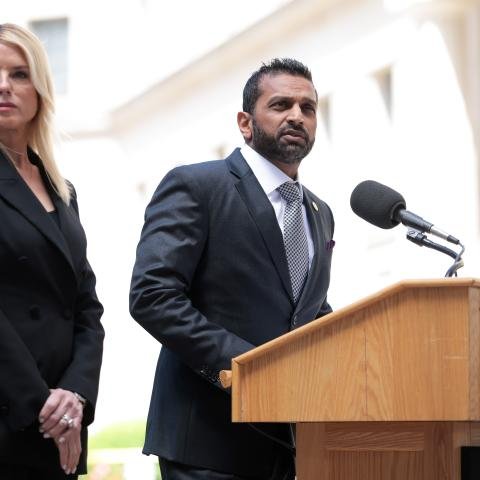
The Justice Department, FBI, and IRS during the first Trump administration slow-walked, declined to aggressively pursue, or squashed investigations into potential criminal behavior by James Comey, Hillary Clinton and her Clinton Foundation, now Sen. Adam Schiff, Hunter Biden, and other politically-sensitive figures.
A host of declassifications published by Just the News in recent weeks have revealed new details about these investigations by the DOJ, FBI, and IRS — including previously unknown details about how many of these inquiries were delayed or ground to a halt during President Donald Trump’s first term in office.
Newly-declassified records detail evidence that since-fired FBI Director Comey approved leaking classified information despite his denials to the contrary, including using his lieutenants and friends to leak to the media.
New allegations about how then-Rep. and now-Sen. Adam Schiff, D-Calif., may have leaked classified information to hurt Trump as well also surfaced, as well as new information on how inquiries into the Clinton Foundation were shut down. The Trump DOJ declined to pursue prosecutions in any of these matters.
The IRS investigation into now-former President Joe Biden’s son, Hunter, was also first slow-walked by the DOJ during the first Trump administration, according to whistleblowers. And special counsel John Durham — appointed by then-Attorney General William Barr — did not pursue prosecutions against members of the intelligence community or FBI (except for Kevin Clinesmith), despite the politicized nature of the Trump-Russia investigation.
There is some emerging evidence that the current Justice Department and FBI under Attorney General Pam Bondi and FBI Director Kash Patel will be more aggressive this time around. FBI agents early on Friday raided the suburban Maryland home of former National Security Advisor John Bolton as part of an investigation into a national security matter.
Patel seemingly hinted at the action on his X social media account, writing that “NO ONE is above the law… @FBI agents on mission.”
-
James Comey gets away with authorizing the leak of classified information
The bombshell revelations involving ex-FBI general counsel James Baker and ex-Comey chief of staff James Rybicki were memorialized in documents that Patel discovered earlier this year, but the passages were originally redacted by the Justice Department in versions sent to Congress earlier this month.
The memos detail evidence and interviews gathered by U.S. Postal Inspection Service agents concerning classified information leaked to The New York Times in October 2016, ahead of the November election in which Republican Donald Trump defeated Democrat Hillary Clinton.
“The USPIS Investigation also revealed Baker disclosed USG [U.S. government] classified information to the NYT under the belief he was ultimately instructed and authorized to do so by then FBI Director James Comey,” one summary memo reads. “For example, during interviews, Baker indicated FBI Chief of Staff James Rybicki instructed him (Baker) to disclose the information to the NYT, and Baker understood Rybicki was conveying this instruction and authorization from Comey.”
Rybicki, as Comey’s chief of staff, and Baker, as the FBI’s top lawyer, both played key roles in the FBI’s investigations into Clinton’s mishandling of classified information and into baseless claims of Trump-Russia collusion.
Comey did not respond to a request for comment sent through his book website. Rybicki did not respond to a request for comment, and Baker previously declined to comment through his attorney.
An FBI memo said that by late December 2017, Durham and USPIS “completed their investigation and provided a memorandum with their conclusions and recommendations to Attorney General Jeff Sessions.”
The FBI field office later issued a memo in late February 2020 indicating that the investigation had ended with the U.S. attorney’s office in the nation’s capital declining to prosecute. Durham and USPIS “completed their investigation” in mid-December 2018, and the “Durham Memo” sent to then-acting Attorney General Matthew Whitaker “recommended NO prosecution of Baker or anyone else,” the recently-declassified portion of the FBI record revealed.
The FBI memos stated that in late January 2020 the U.S. Attorney’s Office in D.C. “issued a prosecutorial declination decision for TROPIC VORTEX.”
-
Comey friend Dan Richman not charged despite denials “with a discount”
Just the News reported earlier this month that FBI agents did force a stunning admission that Comey used a special conduit to a Pulitzer Prize-winning New York Times writer in his bid to polish his image and push for a special prosecutor to take down Trump.
Columbia University law professor Daniel Richman admitted to agents that he routinely communicated on behalf of Comey, his longtime friend, with Times reporter Michael Schmidt, whose work was among the newspaper’s Pulitzer-winning stories on the Russiagate saga. The goal, Richman told the FBI, was “to correct stories critical” of Comey and the FBI and to “shape future press coverage.”
The Times article in question wrongly argued that, in the case of the Trump-Russia investigation, Comey “conducted the investigation by the book.” Richman insisted to federal agents that he did not believe he had confirmed or provided classified intelligence to reporters but said he could not be 100% certain, the memos state, noting he could only make his leak denial “with a discount.”
Richman did not respond to a request for comment.
The “summary of investigative steps” by the FBI included interviews with bureau and intelligence community officials, document reviews, phone and email records searches, the review of a 2017 leak investigation conducted by then-U.S. Attorney John Durham and the U.S. Postal Inspection Service, and more.
“Based upon discussions with DOJ, these investigative steps did not generate sufficient proof to charge any individual with willfully transmitting the Classified Information, conspiring to transmit the Classified Information, or aiding and abetting another person’s Transmission,” the FBI concluded in 2021.
The FBI claimed that “the investigation has not yielded sufficient evidence to criminally charge any person, including Comey or Richman, with making false statements or with the substantive offenses under investigation.”
-
Comey also got away with leaking his “Comey Memos”
DOJ Inspector General Michael Horowitz wrote a report released in August 2019 criticizing Comey’s decision to leak his so-called “Comey Memos” — including details about Trump’s alleged comments about Lt. Gen. Mike Flynn — to the media in 2017 in an effort by the then-fired FBI director to spur the appointment of a special counsel.
Horowitz wrote that his investigation “interviewed 17 witnesses, including former Director Comey and Daniel Richman, the individual who, at Comey’s request, shared the contents of one of the Memos with a reporter [Schmidt] for the New York Times.” Comey told Horowitz that the day after being fired by Trump, he retained Richman as an attorney.
“We have previously faulted Comey for acting unilaterally and inconsistent with Department policy,” the DOJ watchdog wrote. “Comey’s unauthorized disclosure of sensitive law enforcement information about the Flynn investigation merits similar criticism.”
Comey admitted in 2017 that he had hoped leaking this information “might prompt the appointment of a special counsel.” Horowitz concluded Comey’s leaks were “an attempt to force the Department to take official investigative actions.” Comey’s leak efforts were successful, and Mueller was appointed special counsel a day after The New York Times began publishing the contents of Comey’s memos.
Horowitz sent a criminal referral to the DOJ over Comey’s memos at the time, but the DOJ declined to prosecute.
An article in the Times penned by Schmidt was titled “Comey Memo Says Trump Asked Him to End Flynn Investigation” and was published on May 16, 2017. Then-Deputy Attorney General Rod Rosenstein appointed Mueller as special counsel the next day.
After two years, Mueller “did not establish” any criminal Trump-Russia collusion.
-
Adam Schiff not charged with leaking classified info
A career intelligence officer turned whistleblower who worked for Democrats on the House Permanent Select Committee on Intelligence (HPSCI) for more than a decade repeatedly warned the FBI beginning in 2017 that Schiff had approved leaking classified information to smear Trump over the now-debunked Russiagate scandal, according to FBI memos first obtained by Just the News earlier this month.
The FBI interview notes stated that the intelligence staffer — a Democrat by party affiliation who described himself as a friend to Schiff and former Republican House Intelligence Chairman Devin Nunes — considered the classified leaking to be “unethical,” “illegal” and “treasonous,” but was told not to worry about it because Schiff believed he would be spared prosecution under the Constitution’s speech and debate clause.
Patel told Just the News earlier this month that “certain officials used their positions to selectively leak classified information to shape political narratives” and that “it was all done with one purpose: to weaponize intelligence and law enforcement for political gain.”
In his most recent interview with the bureau in 2023, the whistleblower, whose name is redacted, told agents from the FBI’s St. Louis office that he personally attended a meeting at which Schiff authorized leaking classified information.
“When working in this capacity, [redacted staffer’s name] was called to an all-staff meeting by SCHIFF,” the interview report said. “In this meeting, SCHIFF stated the group would leak classified information which was derogatory to President of the United States DONALD J. TRUMP. SCHIFF stated the information would be used to indict President TRUMP.”
Schiff has denied the allegations, telling Just the News that “Kash Patel’s latest smear against Senator Schiff is absolutely and categorically false.”
DOJ Inspector General Michael Horowitz released a December 2024 report — A Review of the Department of Justice’s Issuance of Compulsory Process to Obtain Records of Members of Congress, Congressional Staffers, and Members of the News Media — which detailed some of the actions the Justice Department took in response to the Democratic staffer’s allegations to the FBI.
The staffer — referred to as “Committee Witness” in the DOJ watchdog report — “voluntarily told the FBI that the Committee Witness suspected that two Democratic Members of Congress (Member 1 and Member 2) and a number of Democratic staffers could be leaking classified information on the same general subject matter as the classified information at issue in the Washington Post 2 leak,” Horowitz’s report recounted.
Horowitz said that the FBI and the federal prosecutors “ultimately determined that the Senior Committee Staffer likely did not leak the classified information to the reporters and the investigation was closed without any charges being filed.”
The FBI noted that, in a related leak investigation, “some of the disclosures occurred shortly after a ‘Read Room’ was established … for members and staffers” of the House and Senate Intelligence Committees “to review the classified information, which was released in the aforementioned publications.”
The memo noted that “a former HPSCI staffer contacted the FBI and reported that a former HPSCI Staff Director, a main person of interest (POI), directed HPSCI staffers to leak classified information in 2017.” The FBI’s Washington field office “interviewed the POI for over three hours” in mid-May 2020, and “the POI freely admitted to contact with the media as part of his job responsibilities and denied leaking any classified information.” The FBI investigative team eventually concluded that “it was unlikely the POI was the source of the unauthorized disclosures.”
The FBI memo states that further efforts to follow this particular line of inquiry were soon stymied by a House Intelligence Committee lawyer — with the FBI declining to pursue that avenue further.
-
Leak investigation failures were widespread
In total, the FBI launched more than half a dozen wide-ranging investigations into leaks to the media as numerous legacy outlets deployed the classified information to push false claims of Trump-Russia collusion. The bureau failed to hold anyone accountable for the classified leaking, a Just the News investigation from this month showed.
These numerous FBI leak inquiries — Arctic Haze, Genetic Christmas, Sirens Lure, Foggy Falls, Riding Hood, Echos Fate, and Tropic Vortex — all came up short in finding the source of classified leaks or prosecuting anyone for leaking.
The problems that FBI investigators said they faced included large pools of potential leakers within the federal government sometimes numbering in the dozens or into the hundreds due to the wide dissemination of the intelligence, uncooperative Justice Department partners, restrictions on the use of data from the spy agencies which were victims of the leaks, investigations being launched only many months after the leaks occurred, congressional staffers invoking speech or debate privilege to stymie inquiries, DOJ declining to pursue prosecutions, and more.
-
IRS criminal probe into Clinton Foundation abruptly shut down
Years after the FBI was forced to shut down multiple corruption probes of Bill and Hillary Clinton’s charity in 2016, the IRS under Trump began a criminal tax investigation into the Clinton Foundation and its dealings with other players on the global charity stage, but then abruptly stopped working with whistleblowers in spring 2019, according to IRS memos and internal emails released by Just the News earlier this month.
The Clinton Foundation has long denied it did anything wrong and said any suggestion of wrongdoing was politically motivated.
The IRS appears to have moved from a serious initial interest in pursuing the Clinton Foundation’s potential wrongdoing to slamming on the brakes, allegedly claiming that such an inquiry couldn’t and wouldn’t be launched after all. All investigative activity had seemingly come to a halt by July 2019.
John Moynihan, a retired Drug Enforcement Agency financial crimes analyst, and Larry Doyle, a corporate tax compliance expert, had spent years researching the Clinton Foundation, testifying to Congress about it and providing the IRS with evidence of alleged financial wrongdoing by the Clinton Foundation.
While one IRS official purportedly said that the whistleblower documents on the Clinton Foundation indicated that “the entire enterprise is a fraud,” the IRS’ stance soon shifted.
“Can’t talk about the CF,” a memo states in recounting how IRS agents suddenly cut off contact with two whistleblowers they had been working with for weeks.
The notes also contend that, despite the huge size and resources of the IRS, an IRS official told the whistleblowers “that the IRS really is not in a position to pursue charitable organizations that engage in purposes and activities beyond their approved authority” and that “the IRS is not capable or staffed to oversee this activity.”
-
Uranium One controversy allowed to peter out without thorough inquiry
The DOJ under Trump’s first term would fail to thoroughly investigate the Uranium One saga and allegations of corruption related to the Clinton Foundation.
Uranium One, a Canadian uranium mining company, is also a wholly-owned subsidiary of Russian state-owned Rosatom. The sale of Uranium One to Rosatom was the focus of great controversy and scrutiny from Republicans and others, who argued that then-Secretary of State Clinton helped approve the deal and that the Clinton Foundation may have stood to benefit from it.
Attorney General Jeff Sessions asked U.S. Attorney John Huber of Utah to review these allegations in November 2017, but did not make Huber a special counsel.
Then-Assistant Attorney General Stephen Boyd had sent a letter to the GOP-led House Judiciary Committee in 2017 in response to letters “in which you and other Members request the appointment of a Special Counsel to investigate various matters, including the sale of Uranium One, alleged unlawful dealings related to the Clinton Foundation, and other matters.” Sessions then forwarded that letter to Huber and told the federal prosecutor that “I have requested that you review the matters referenced” in the letter but to avoid any matters being looked at by then-special counsel Robert Mueller.
The New York Times reported in 2015 that “as the Russians gradually assumed control of Uranium One in three separate transactions from 2009 to 2013 […] a flow of cash made its way to the Clinton Foundation. Uranium One’s chairman used his family foundation to make four donations totaling $2.35 million. Those contributions were not publicly disclosed by the Clintons, despite an agreement Mrs. Clinton had struck with the Obama White House to publicly identify all donors. Other people with ties to the company made donations as well.”
“And shortly after the Russians announced their intention to acquire a majority stake in Uranium One, Mr. [Bill] Clinton received $500,000 for a Moscow speech from a Russian investment bank with links to the Kremlin that was promoting Uranium One stock,” the Times reported. “At the time, both Rosatom and the United States government made promises intended to ease concerns about ceding control of the company’s assets to the Russians. Those promises have been repeatedly broken, records show.”
“They also obtained an eyewitness account — backed by documents — indicating Russian nuclear officials had routed millions of dollars to the U.S. designed to benefit former President Bill Clinton’s charitable foundation during the time Secretary of State Hillary Clinton served on a government body that provided a favorable decision to Moscow,” The Hill reported.
A leak to The Washington Post indicated that Huber was winding down his efforts by January 2020. It was reported by Fox News in September 2020 that “aspects” of “Huber’s investigation into the Clinton Foundation have been assumed” by then-U.S. Attorney John Durham “as part of his review into the origins of the Russia probe.”
But John Durham’s 2023 special counsel report said that his appointment order by then-Attorney General Barr did not include the Uranium One saga within its scope, with the Durham report stating that “we have not interpreted the Order as directing us to consider matters addressed by the former United States Attorney for the District of Utah.”
-
John Durham largely fails to secure convictions
DOJ Inspector General Horowitz served up ex-FBI lawyer Kevin Clinesmith to be hit with the sole successful criminal prosecution carried out by special counsel Durham. Horowitz’s June 2018 report unearthed Clinesmith’s clear biases against Trump, and his December 2019 report detailed Clinesmith’s criminal behavior related to the FISA process. The FBI lawyer worked on both the Hillary Clinton emails investigation and the Trump-Russia inquiry.
The DOJ watchdog detailed a lengthy instant message exchange between Clinesmith and another FBI employee on Nov. 9, 2016 – the day after Trump’s presidential victory – where Clinesmith lamented Trump’s win and worried about the role he had played in the investigation into Trump and his campaign.
“My god damned name is all over the legal documents investigating his staff,” Clinesmith said. “So, who knows if that breaks to him what he is going to do?”
Clinesmith also declared “Viva le resistance” later in November 2016.
Clinesmith would plead guilty to falsifying a document during the bureau’s efforts to renew FISA authority to wiretap Carter Page. Clinesmith admitted in August 2020 that he had falsely edited a CIA email in 2017 to state that Page was “not a source” for the CIA when the agency had actually told the bureau on multiple occasions that Page had been an “operational contact” for the CIA.
Judge James Boasberg would deny Durham’s efforts to seek up to six months behind bars for Clinesmith, instead giving him a year of probation, 400 hours of community service and no fine.
Despite the significant problems with the January 2017 intelligence community assessment — including its use of the Steele Dossier to bolster a key claim about Putin’s intentions in 2016, its ahistorical claim that the Kremlin had historically preferred Republicans to Democrats, its failure to lay out any details about Chinese election influence efforts despite promises that it would, then-President Barack Obama’s endorsement of the CIA’s leaked position on Putin’s motives prior to the completion of the ICA, and more — Durham seemingly endorsed the flawed ICA in his report and did not pursue any criminal charges related to it.
Durham’s report said that Russia’s election meddling efforts “are well-documented in the careful examinations undertaken by” the Senate Select Committee on Intelligence, with the Durham report specifically pointing readers to the Senate committee’s 2020 report on “Assessing Russian Activities and Intentions in Recent U.S. Elections” and also pointing readers to the ICA itself.
Despite Durham’s recommendation, the Senate report made no mention of the fact that then-CIA Director John Brennan pushed to include the Steele Dossier in the ICA, nor did it include the fact that a reference to the dossier made it into the main body of the most highly-classified version of the ICA, with the Senate report instead including the since-discredited claim that the dossier was not used in and did not inform the ICA.
That conclusion was debunked by a recently-declassified House Intelligence Committee report and by a recent CIA review, and contradicted by a public House intel report and other declassified records as well.
-
Slow-walking of Hunter Biden case
The two IRS whistleblowers who shed light on failures to properly investigate Hunter Biden — and who were allegedly retaliated against as a result — detailed how the investigation into Joe Biden’s son was repeatedly slow-walked and derailed during the Biden administration, but also revealed details of their inquiry being stalled by DOJ officials during the first Trump administration.
IRS supervisory special agent Gary Shapley and IRS special agent Joseph Ziegler were harshly critical of then-special counsel David Weiss’s handling of the Hunter Biden investigation, arguing he had slow-walked the case. But they argued that the delays in the case started during Trump’s first term.
Ziegler, who filed a now-released December 2019 application for a search warrant for Hunter Biden’s MacBook Pro, detailed the slow-walking in 2020 in 2023 testimony to Congress.
Shapley’s whistleblower testimony to Congress in 2023 revealed that “the FBI became aware that a repair shop had a laptop allegedly belonging to Hunter Biden and that the laptop might contain evidence of a crime” in October 2019 and that “the FBI verified its authenticity” in November 2019.
Shapley said that by early 2020 his IRS team was “working closely with the FBI and the Delaware U.S. Attorney’s Office and Department of Justice Tax” but that “it soon became clear to me this case was being handled differently than any I’d seen before.”
“After former Vice President Joseph Biden became the presumptive Democratic nominee for President in early April 2020, career DOJ officials dragged their feet on the IRS taking these investigative steps. By June 2020, those same career officials were already delaying overt investigative actions,” Shapley said, adding that “it was apparent that DOJ was purposely slow-walking investigative actions in this matter.”
Shapley said that “I pointed out that if normal procedures had been followed we already would have executed search warrants, conducted interviews, and served document requests” in a mid-June 2020 call, but “nevertheless, my IRS chain of command decided we would defer to DOJ.”
Shapley said that he told his superiors in June 2020 that “DOJ Tax has made a concerted effort to drag their feet concerning conducting search warrants and interviewing key witnesses in an effort to push those actions to a timeframe where they can invoke the Department of Justice rule of thumb concerning affecting elections.”
Shapley said that “we needed to search the guest house at Biden’s Delaware residence where Hunter Biden stayed for a time” but that DOJ officials blocked that from happening.
Shapley also said that “the prosecutors even wanted to remove Hunter Biden’s name from electronic search warrants … and document requests.” He added that then-Associate Deputy Attorney General Richard Donoghue in September 2020 also “issued a cease and desist of all overt investigative activities due to the coming election.” Shapley added that Wolf “made several odd statements, to include that DOJ was under fire, and it was self-inflicted” and “stated that DOJ needed to repair their reputation.”
Then-President Biden pardoned his son in December of 2024, despite promising he wouldn’t do so.




